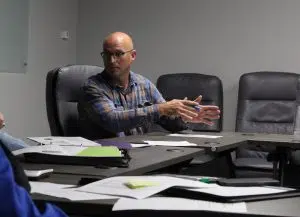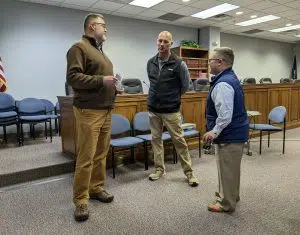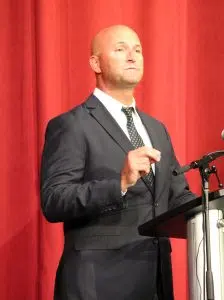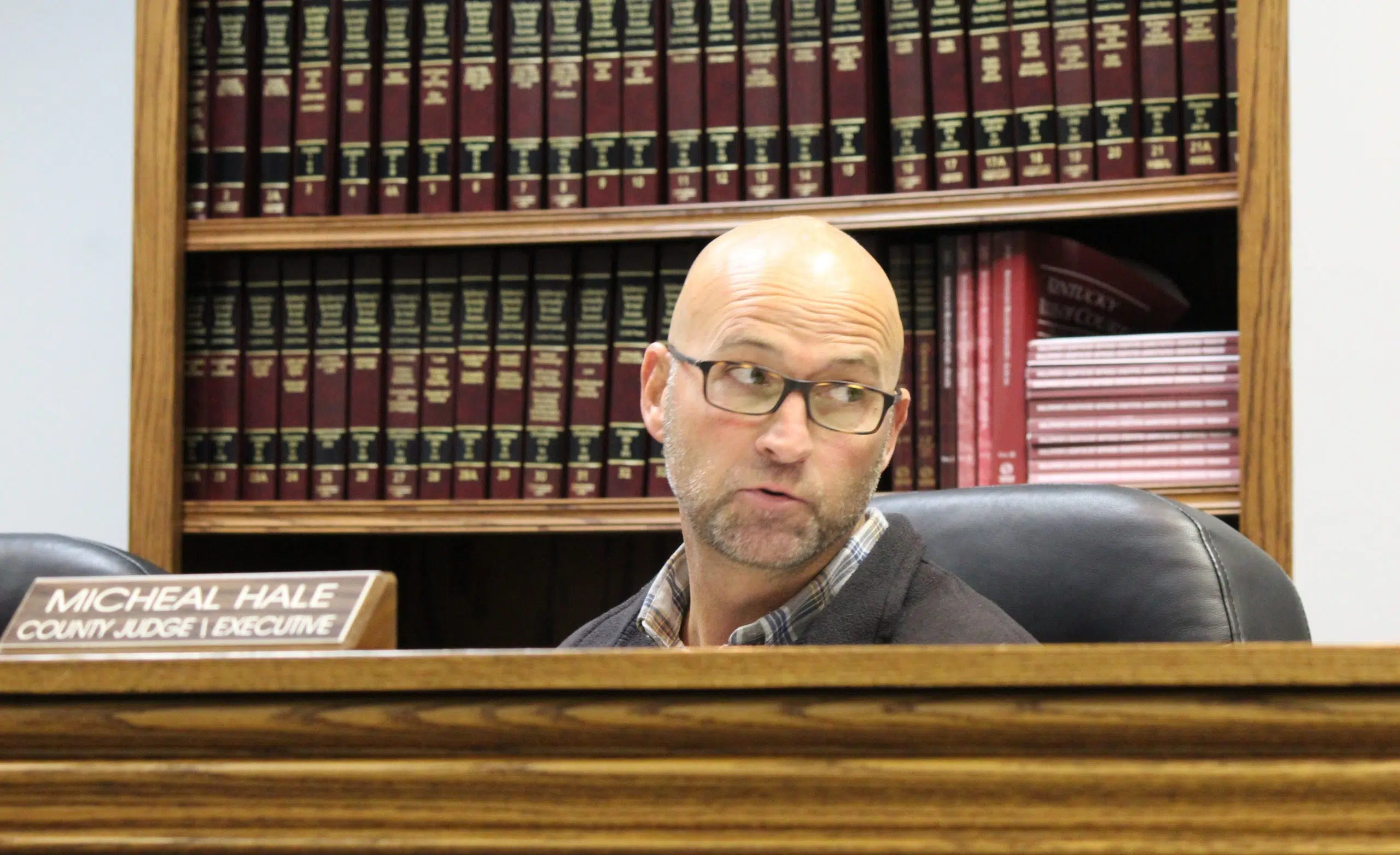BY MELINDA J. OVERSTREET / GLASGOW NEWS 1
“You know, when you’re on the outside looking in, you feel like that you have the answers,” said then-Barren County Judge-Executive Micheal Hale before his second four-year term in the position concluded.
Glasgow News 1 asked Hale to discuss some of the key points from his time in office.
“I never really thought that I had the answers for everything,” he continued, “but, you know, I’ve been a public servant my whole life, so I wanted to continue serving Barren County in some fashion and judge-executive is a way of being able to make positive impacts on people’s lives – not just certain groups but I mean all kinds of different folks. I learned pretty quick that our community was in dire need of help in different areas. We had people who were struggling; we had people that just needed a leg up.”
County budget
Other than being “baptized” by about 14 inches of snow — rather than fire, which the retired city firefighter who still serves with a volunteer department some is used to combating – during his first week in office, the primary thing that Hale said was something of a rude awakening was the county’s money situation.
“I didn’t realize the county was in such bad financial condition. I started looking at what size the budget was versus the debt ratio to how much tax money was collected just by the county, and I knew, really quickly, that there was more money going out than there was coming in, and I didn’t need an audit to tell me that. I was advised, you need an audit going in. I didn’t have to, once we looked at the numbers and I listened to the experience that was already here from the [then-]current treasurer who had been here several years, the fiscal court clerk [and] Mrs. Houchens (then-deputy judge-executive). You know, they did what they could do to manage this, because they are a huge part of the financial piece. So I introduced the word ‘no’ pretty quick. ‘No, we can’t buy it. No, we can’t afford it.’ And then from there, I started trying to figure out our bonding capacity and it was very low, due to the fact that we just didn’t have a lot of cash on hand. Again, we were spending more than we were bringing in. I knew we had to get a handle on that pretty quickly. So, getting a handle on that and just learning the position. That first 12 months was a big learning curve for me,” Hale said. “And then, knowing the court and their capabilities. Who’s there to help us with things like that? Who would be an asset on that court? You would hope all of them would be, but, you know, sometimes politics gets in the way of that, but I really leaned on the ladies that were here – and they’re still here – to help with that.”
Significant steps were taken to start moving things in the correct direction.
“You’re six months into [the fiscal year] and you’re looking at a financial statement that basically says you only have $7,100 in your rainy day fund, and you’ve just set in court knowing you’re only carrying over a negative and they’re sitting there making motions and approving and making motions, but we were in the habit of having to borrow money from the transportation side of it, in the tune of $600,000. Of course that was paid back once taxes [revenue] started coming in.”
By that, he meant they had to borrow from state transportation funds just to pay the normal monthly bills. Statutes allow for that type of borrowing, but with a limited time for paying it back, he said.
“We done that that first time, and I thought, ‘We continue to do that and the road work stops, because that’s a huge chunk of money right there.’ And I said, ‘We’re never going to do that again,’ and we haven’t done that again. We just started chipping away at little things, just like the [current] jail debt service. I knew that was one of our largest debts that we had.
He said he became friends with then-Hart County Judge-Executive Terry Martin, and they realized they had some similar issues. Hale said Martin told him that his goal was, when he sat down with his jailer regarding the budget cycle, that he had money to work with, so he made that a goal of his own.
“And we had all that debt service paid for except about $20,000, but we were well on our way to being a self-sustained detention center,” Hale said.
Within the past 10 years, the amount of funds required from the general fund to help with jail operations had decreased until it no longer was necessary and, in fact, the jail was putting funds back into the general fund through revenues from its commissary.
“And that’s kind of went the other way,” Hale said. “Of course, it’s changed hands [four years ago] and the court’s changed. Folks need to understand I’m only one vote on the court.”
He added that he’s a little disappointed with where the detention center is now, and he anticipates that the new fiscal court will have a challenge with it that will require some significant spending. He estimated almost $1 million “just to get it back to where it needs to be” with regard to maintenance, personnel, competitive pay and taking care of inmates. And it’s not just the jail that will require more funds, because prices are rising on everything, he said.
“But I think the financial situation is 10 times better than what it was,” Hale said.
“We’re leaving it in very good shape,” he said of the current budget. “Now we’re carrying over almost $3 million, and we have $1 million in reserve, and our bonding capacity’s went from about $2 million to almost $60 million, and we’ve been able to bring our debt ratio down below our operating budget, which was very important to me, and we’ve paid off several [debts] – this building, the old jail, ballpark lighting – and on top of that, we’ve been able to give raises, so I’m very proud of that.”
Ambulance service
“Another issue that I feel like that I’ve been a huge part of has been our ambulance service,” Hale said.
As judge-executive, he automatically had a seat on the board of directors for Barren-Metcalfe Emergency Medical Services, which had its share of financial difficulties and uncertainties with regard to revenue sources for many years. He had the opportunity to see the situation from both the county budget side and the ambulance service side.
“That was another financial burden on the county …. Both city and county were paying to the tune of about $250,000 a year. I saw really quickly that we needed to provide permanent funding for the ambulance service. We had ambulances that were breaking down on the side of the road. The personnel was underpaid; they’re still not where they need to be.”

Then-Barren County Judge-Executive Micheal Hale speaks at a meeting of the Barren-Metcalfe Emergency Communications Center 911 Governing Board in November 2022. MELINDA J. OVERSTREET / GLASGOW NEWS 1
Mike Swift, the director of the ambulance service for the first 40 or so years it existed, had long advocated for the creation of an ambulance service taxing district to establish a reliable revenue flow.
“Was it our turn to finish what he started? I believe it was. It wasn’t the easiest thing to do,” Hale said.
Then it became increasingly apparent that Barren County tax funds were subsidizing Metcalfe County’s portion of operational costs.
“And that’s where a lot of the money was going, and until you take a stand against that, which I did – I took a hard stand against that …,” he said., relaying some percentage examples. “So far, we’ve been able to do exactly what my vision has been there. I have to credit Charlie O’Neal; he brought the cost accounting method in [that applied the revenues and expenses specifically to the appropriate county]. It’s really worked out great. It’s been a good partnership.”
He added that Barren-Metcalfe Emergency Communications Center’s budget needs to be addressed in the same manner.
“I’m proud of where the ambulance service is. … Now we’ve got land to build a permanent [headquarters] for that, which is much needed, because our community’s growing. The service has got to grow.”
Economic development
“People hound you about – hey, we need jobs, we need jobs, we need jobs. OK. I get it. I understand that. But what the most eye-opening thing was, was the [lack of] support of our existing industry. That’s what I wanted to focus on first,” Hale said.
“[Existing local] companies were reaching out saying, ‘Listen, we’re going to be looking at other areas if people don’t start helping us or at least coming around and acknowledging us,’” he said. “So I started knocking on doors and saying, ‘Hey, what do you need?’”
It took a little longer, he said, but then he began to understand some dynamics that were happening in the background that he feels was a primary reason new companies were not entertaining the idea of locating here.
“There’s reasons why our community doesn’t grow, and some of those folks stand out front and cheer, but they’re really in the background going, ‘I don’t want to grow,’” he said.
He added that they were only willing to have change if they could benefit from it financially, “and that’s what really irritated me.”
Tthere were people who wanted to come here, Hale said, “but if they don’t play it by certain people’s rules, they’re not coming here, or they’re not going to be allowed to come here, and that was very disappointing.”
He believes then some local folks started seeing him as someone who wouldn’t play their political game, which possibly tied into some other issues.
“You have a lot of good people in this community that want to see this community strive and do really good. A lot of times they’re not very vocal about it, and I wish they would be vocal about it, because people would listen to them, but we have some people that just talk loud all the time, and they really don’t want this community to grow and strive, and it’s hurtful,” Hale said.
He also learned, he said, that the county didn’t have a lot of properties to show prospective industries at that time.
“Yeah, we had grass. We had a few lots, but we really didn’t have inventory to offer people. … Companies want a minimum of 100,000 square feet, it was only 60,000,” he said. “We worked on our real estate. We have over 200 acres to offer companies now, between Cave City and our South Cooper park. We have three build-ready sites. We built a 100,000-square-foot spec building and sold that thing within 12 months.”
A related need is available housing, Hale said.
“We need workforce housing worse than anytime we’ve ever needed it,” he said.
Hale said that since 2020, we’ve had at least 12 expansions of existing industry, which produced almost 500 new jobs, which is an investment of almost $400 million.
About 16 to 18 months ago, he said, he approached the fiscal court – when a new economic development director was coming aboard – and said the economic authority didn’t have a lot of money and it was going to take some to make some. The county served as a pass-through for a bond sale for them that was used to purchase and do preliminary work at South Cooper Industrial Park in Glasgow and help some with Chapatcha Industrial Park in Cave City.
The county also started a few years ago doubling its annual contribution for economic development operations from $60,000 to $120,000.
“So overall, economic development has progressed,” Hale said, adding that the economic development team is really getting out there and promoting Barren County and the authority is really supporting them.
Tourism is also a part of economic development, and Hale said that with the current leadership in staff and board positions, he feels it’s in a good place.
“Tourism has come a long way,” he said.

Circuit Judge John T. Alexander, then-Barren County Judge-Executive Micheal Hale and District Judge Gabe Pendleton chat after the Dec. 28, 2022, meeting of the Barren County Judicial Center Project Development Board. MELINDA J. OVERSTREET / GLASGOW NEWS 1
To be continued
Glasgow News 1 asked Hale to discuss the areas that still need focus where he’d like to see work carried forward.
He first listed the focus on workforce development and educational opportunities, including providing real-world work experience for youths, who are the future leaders, voters, residents and taxpayers of the community.
“They need to know what the community has to offer them now, and if there’s something that we’re missing, we need to listen to them. As I’ve said, if we’re having a conversation about the future and these young people are not standing there with you, … we are doing them a disservice.”
Next he said, “We have to focus more on the addiction piece in our community. It’s not a pleasurable thing to say when you’re somewhere else, ‘We have the second-largest drug court in the state of Kentucky.’ But it has to be talked about.”
More services are available in Glasgow now to help individuals with addition, but, Hale said, “We have to do more. A lot of these folks need housing. They need transportation. … There’s good people out there that’s working on that, and I hope they take this and keep running with it, and I’ll still be available to help out at any time because I’m invested in it.”
Hale said he would also like to see more park space developed and options for special-needs children – things he advocated for but couldn’t get agreement from the fiscal court to do.
Advice for successor
The best advice Hale said he could offer the new judge-executive, Jamie Bewley Byrd, was this:
“Be aware of who confronts you about things, because there will be so many people that won’t come talk to you, but they will send somebody to talk to you. Think about what’s really behind the confrontations.”
He tries to be straight up with people to tell them what he’s going to do or wants to do so they know what’s coming, but not everyone is like that.

Micheal Hale speaks at an October 2022 candidate forum. MELINDA J. OVERSTREET / GLASGOW NEWS 1
“You’re going to get a lot of people that’s going to pat you on the back. They’re going to tell you how great you are. They’re going to really pump you up, but you’ve got to know at the end of the day, it’s for their benefit, not yours,” Hale said. “They’re just using you. Again, I’ve been able to learn people in this position – who’s out for what. Don’t make promises. Don’t do it. If you’ve already made them, you’d better back them up.”
He said he’s avoided making promises, because he can’t know what will actually end up happening.
“Don’t just focus on the group that is successful. Always know that there’s a group that needs help being successful, and you can’t forget about those folks,” Hale said. “I’ve always tried to focus on the ones that need a leg up in life. People that are successful, they’ve done what they want to do. They should be helping the people that need the help, but a lot of times you don’t see that.”
He acknowledged that sometimes people who are helping people for good reasons do so quietly, behind the scenes, not seeking the limelight.
And finally: “Don’t get too big for your britches,” he said. “The one thing about the general public — they will humble you, and you need to listen to what they say. I’ve always listened. I haven’t always done what they’ve said, but I did listen.”
What’s next?
Hale said he’s been working in ways that served other people since before he graduated high school, so
“I’m always going to work and do something and try to continue to make a difference ….”
He said that eight years with a lot of office time may have “softened” him up a bit too much, and he’s ready to get more dirt under his nails again and break a sweat a lot more often.
“I want to work. I’m just geared that way,” Hale said in late November.
As of Dec. 29, though, no ideas were firm, he said.

Comments